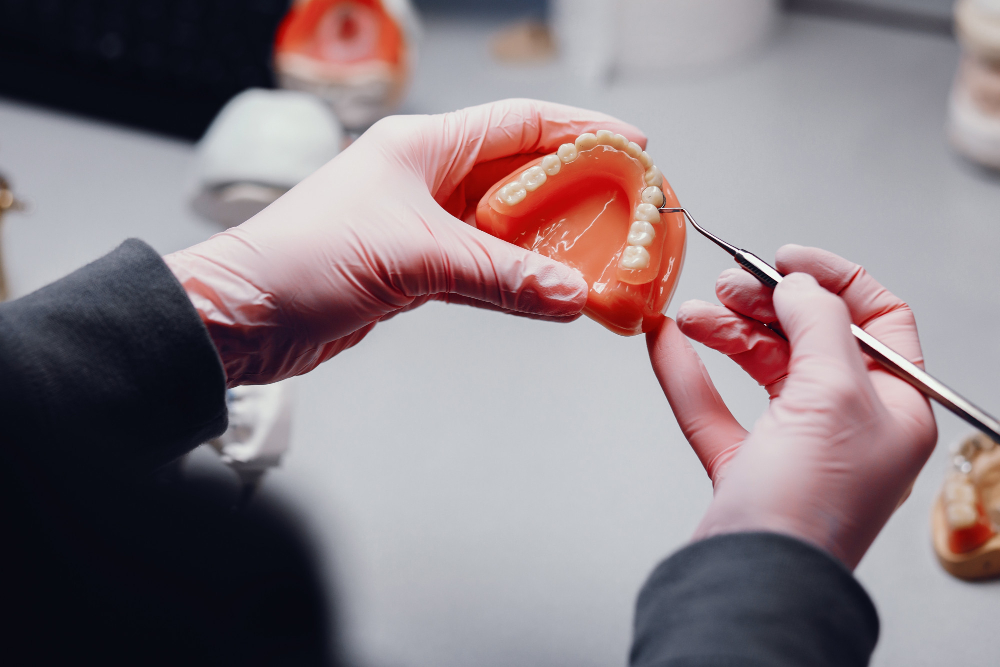Do you ever feel pain or discomfort when wearing dentures? Many people are unaware of the variety of negative effects that can result from poorly fitted dentures. This piece will address the lesser-known side effects of ill-fitting dentures.
What is an improperly fitting denture?
Dentures that don’t fit properly in the mouth are called ill-fitting prosthetics (sometimes called “false teeth”) and can happen for various reasons. The user of such dentures may experience several issues and discomforts.
What Lesser-Known Side Effects Can Bad Dentures Cause?
Even though many are aware of the common side effects, there are other less common side effects and repercussions that may occur with wearing dentures, in addition to well-known ones, including mouth sores, pain, and difficulty chewing.
Changes in Taste: Taste buds, particularly those on the palate, can be covered by ill-fitting dentures, which results in a weaker sense of taste.
Digestive Problems: Larger pieces of food may be eaten if a person cannot chew effectively because of improperly fitted dentures, which can cause digestive issues.
Excessive Saliva Production: Ill-fitting dentures may increase saliva production as the body tries to acclimate to the foreign object.
Facial Muscle tension: People may experience facial muscle tension from trying to hold ill-fitting dentures in place, which can eventually cause weariness and discomfort.
Changes in Facial Appearance: If dentures don’t support the face adequately, the facial shape may shift, giving the face a “sunken” appearance, particularly in the lower face.
Poor Breath: Poorly fitting dentures can collect food particles, which, if left unclean, can promote bacterial growth and poor breath.
Increased Risk of Oral Infections: Uncomfortably fitted dentures can leave spaces and gaps that serve as breeding grounds for bacteria and fungi, raising the possibility of infections like candidiasis.
Reduced Self-Confidence: Constant anxiety about dentures coming loose or slipping can harm self-confidence, making one avoid social situations or eating in public.
People who wear dentures should visit a dentist regularly for checkups and express any discomfort or concerns. Simply search denture repairs near me online to find reputable dental offices close to you.
How can the lesser-known side effects of ill-fitting dentures be addressed?
Here are some ways to deal with these negative effects:
Regular dental examinations: Spotting fit or alignment difficulties with regular dental or prosthodontic appointments will be easier. A dentist can make denture modifications to enhance fit and comfort if the dentures are uncomfortable or causing other problems. Relining a denture is sometimes necessary because the shape of the mouth changes over time.
Replacement: Dentures require periodic replacement. To guarantee a proper fit and function, they must be replaced every 5-7 years (or as a dental practitioner recommends).
Daily Cleaning: Dentures require daily cleaning just like real teeth, which lessens the possibility of oral infections and helps to avoid foul breath. Maintain good oral hygiene by cleaning your mouth, including any leftover food.
Language Therapy: When speech is impaired, a brief session with a speech therapist can help retrain the tongue and lips, improving clarity and pronunciation.
Dietary Modifications: Eat softer meals or cut food into smaller pieces if digestion becomes difficult due to incorrectly chewed food until the denture issue is resolved.
Seek Emotional Support: Having dentures that don’t fit well can be uncomfortable and inconvenient, which can be emotionally taxing. Talking to A therapist or counsellor might be helpful, as can joining a support group.
Conclusively, many of the less well-known adverse effects of poorly fitted dentures can be easily taken care of or avoided by taking action immediately and keeping communication lines open with dental specialists.










